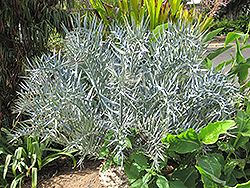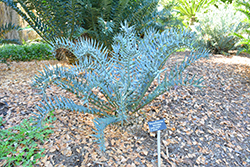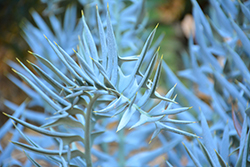It's all about ...
plants

Eastern Cape Blue Cycad
Encephalartos horridus
Height: 5 feet
Spread: 5 feet
Sunlight:
![]()
![]()
Hardiness Zone: 9a
Description:
A small, low growing cycad with spiny, silver-blue leaves that slowly mature to gray-green; develops a short trunk over a long period; an attractive accent or container plant; responds best to deep, rich, well drained soil; tolerant of light frost
Ornamental Features
Eastern Cape Blue Cycad's attractive spiny lobed pinnately compound leaves emerge coppery-bronze in spring, turning silvery blue in colour with showy grayish green variegation the rest of the year on a plant with an arching habit of growth. The bluish-green fruits which fade to tan over time are held in cones from late winter to mid fall. The gray stems can be quite attractive.
Landscape Attributes
Eastern Cape Blue Cycad is a spreading evergreen perennial with a shapely form and gracefully arching foliage. Its relatively fine texture sets it apart from other garden plants with less refined foliage.
This is a relatively low maintenance plant, and should never be pruned except to remove any dieback, as it tends not to take pruning well. Gardeners should be aware of the following characteristic(s) that may warrant special consideration;
- Spiny
Eastern Cape Blue Cycad is recommended for the following landscape applications;
- Accent
- Rock/Alpine Gardens
- General Garden Use
- Container Planting
Planting & Growing
Eastern Cape Blue Cycad will grow to be about 5 feet tall at maturity, with a spread of 5 feet. It has a low canopy with a typical clearance of 1 foot from the ground. It grows at a slow rate, and under ideal conditions can be expected to live for 70 years or more. As an evegreen perennial, this plant will typically keep its form and foliage year-round. This is a dioecious species, meaning that individual plants are either male or female. Only the females will produce fruit, and a male variety of the same species is required nearby as a pollinator.
This plant does best in full sun to partial shade. It prefers dry to average moisture levels with very well-drained soil, and will often die in standing water. It is considered to be drought-tolerant, and thus makes an ideal choice for a low-water garden or xeriscape application. It is not particular as to soil pH, but grows best in rich soils. It is quite intolerant of urban pollution, therefore inner city or urban streetside plantings are best avoided. This species is not originally from North America. It can be propagated by division.
Eastern Cape Blue Cycad is a fine choice for the garden, but it is also a good selection for planting in outdoor pots and containers. Because of its height, it is often used as a 'thriller' in the 'spiller-thriller-filler' container combination; plant it near the center of the pot, surrounded by smaller plants and those that spill over the edges. It is even sizeable enough that it can be grown alone in a suitable container. Note that when growing plants in outdoor containers and baskets, they may require more frequent waterings than they would in the yard or garden. Be aware that in our climate, most plants cannot be expected to survive the winter if left in containers outdoors, and this plant is no exception. Contact our experts for more information on how to protect it over the winter months.
This plant is not reliably hardy in our region, and certain restrictions may apply; contact the store for more information.


